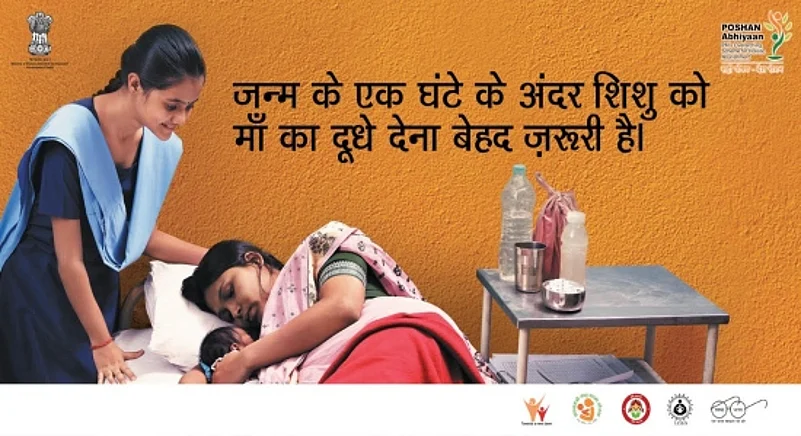“Put the newborn to the breast within one hour of birth. Colostrum is your baby’s first immunisation. Give the infant only breastmilk for the first six months. Do not give water, liquids or foods… Even in very hot weather… Breastfeed frequently and when your child needs it…”
—Poshan Abhiyaan Jan Andolan Guidelines
Lecturing can be tedious. Lecturing can be time-consuming. Lecturing can be a terror. And, right now, the nation is busy lecturing its would-be mothers—about 26 million every year. The World Breastfeeding Week 2019 is round the corner, from August 1-7. Mass campaigns under Poshan Abhiyaan are gearing up. Jan Andolan guidelines across states are asking Anganwadi workers to block the dates on their calendars. More would-be mothers would be subjected to more “counselling” to give more breast milk to their babies.
Advertisement
The question is: when you are tired, nauseated and ravenous at the same time, would you listen to lectures? Especially, if you are underweight, anaemic, don’t have enough household resources, and need to work hard, despite your pregnancy? Public health campaigns in India have always targeted the mothers for not breastfeeding their newborns. No wonder, the policies have never worked.
GLOBAL BLAME GAME
It’s not just India. Every year, the big fora of world health bring out damning testimony, on how the new mothers of the world, including 60 per cent from India, deprive their newborns of “optimal” and “exclusive” breastmilk, making them vulnerable to diseases and death. India ranks 56th, among 76 countries analysed, in early initiation of breastfeeding, reports the UNICEF and the WHO in August 2018.
Advertisement
Only two in five newborns are breastfed within the first hour of life across the world—the golden hour that gives them “the best chance to survive, grow and develop to their full potential.” Breastfeeding in the first hour of life is important, because infants need colostrum, the yellowish breast milk produced initially, that is antibody-rich. Children who miss that, face a 30 per cent higher risk of death within their first 28 days. What’s more, Indian mothers, it seems, are worse than their sisters in Sri Lanka, Afghanistan, Kazakhsthan, Rwanda, Bhutan, Bangladesh and Uruguay.
STATE OF MOTHERS
Why do Indian mothers not breastfeed, as much as expected? The answer came from a 2015 study by Princeton University researchers, published in the Proceedings of the National Academy of Sciences. Greater percentage of Indian mothers are in poorer health than their counterparts in far poorer countries, say, sub-Saharan Africa. By analysing census data, the researchers found that 42 per cent of Indian mothers are underweight, compared to 16.5 per cent in sub-Saharan Africa. And they weighs less at the end of pregnancy than women in sub-Saharan Africa at the beginning.

There’s more. If nearly 40 per cent of all children in India are stunted (extremely low height for their age), and nearly 30 per cent are underweight, a lot of the problem lies with the mother’s health and lack of education. Using data on nearly 29,000 children from the 3rd India National Family Health Survey, 2005-06, researchers at the Harvard T H Chan School of Public Health in a study published in 2015 held that short-term interventions, like, breastfeeding, do not hold the key.
LECTURE HER FAMILY
At the bottom of household hierarchy, subject to the will and customs of their husbands and his family, young mothers often do not have any say in breastfeeding. As a December 2018 study (International Journal of Reproduction, Contraception, Obstetrics and Gynecology), led by Dr M. V. Ramana Rao of SVS Medical College Hospital, Mahabubnagar, Telangana, shows in 90 per cent of deliveries, the baby was not given to the mother, largely due to traditional family practices of first wiping and cleaning the baby before passing it on to a senior family member. It was the family’s decision to throw away the colostrum, as something dirty and unhealthy in most cases, or start breastfeeding from the third day (83%) and giving feeds or formula milk as the first feed.
That 70 per cent women had a fear of holding the newborn immediately after delivery or had not been told about timely initiation of breastfeeding, showed the quality of antenatal counselling they were getting.
Advertisement
A NOVEL INITIATIVE
JIPMER in Puducherry has come up with a unique initiative from October 2018, to bypass family interventions, lack of manpower, dedicated lactation counsellors, staff nurses and delay in procedures and ward transfers. The doctors posted nursing students in labour rooms, as a “Bonding Angel.” It was their responsibility to bring the mother and baby together soon after delivery, ensure correct position and help initiate breastfeeding at the earliest. “This has the potential to prevent hypoglycemia in newborn, facilitate good uterine contraction in the mother and ensure bonding between mother and the baby,” writes Dr Adhisivam B, head of Neonatology in the July 2019 issue of the journal Indian Paediatrics.
Advertisement
THE LAST WORD
Public health policymakers need to understand that social and environmental barriers, more often than not, get in the way. And “counselling” often does not run along scientific lines. Mothers who do not breastfeed do not always make the choice to deprive their children of the benefits of breastmilk.






.jpg?w=801&auto=format%2Ccompress&fit=max&format=webp&dpr=1.0)













